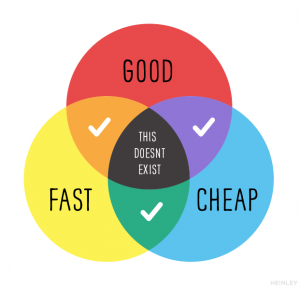This one is attributed to Rod Adair, the famous oil and gas fire suppressing expert. And boy, does it apply to most of us and our offerings.
“Quality” products and services should not be positioned as “cheap,” or your potential customers will question your message from the start, and will be more critical of the  delivered product than if offered as one or the other, but not both.
delivered product than if offered as one or the other, but not both.
“Fast” applies to either service speed (including delivery) or product manufacturing time. If you as a supplier have plenty of spare resources available, you might temporarily get away with adding “fast” to both of the other two attributes of good and cheap.
[Email readers, continue here…] But beware. Being fast usually requires having inefficient links or spare resources in the supply chain that can be stretched at comparatively low cost in terms of your overhead cash and offering quality. If it becomes a part of your long term sales message, there is risk that you will set expectations you cannot achieve. And a disappointment based on missed delivery or completion is as great as one based upon trounced quality or price expectations.
And if you are an Internet seller, “fast” becomes difficult to offer if you know that Amazon (and perhaps others) offer two–day delivery at no charge – and at least Amazon is now providing two–hour day delivery of many items in some metro areas.
So consider this: Make “fast” a tool for use as an inducement for particularly important customers or orders, or at times when resources are underutilized. Offer “fast” when it works for you to close a sale that would not have been likely otherwise.
Red Adair said, “…pick any two.” I think it more appropriate for most of us to concentrate upon “good” (quality) or “cheap” (price) and add “fast” as needed to close the sale or fill the resource cup.
Our good friend Adam Miller, CEO of Cornerstone on Demand, uses words appropriate for software development when describing his version of this “pick any two” quandary. He describes his choice as “cost, quality or scope. Pick two. “
It is an excellent variation on the theme – selecting from a limited menu of the use of resources. Note that the only difference in Adam’s shortlist is that he substitutes “scope” for “fast” – but we could just add “scope” to the three we dealt with above to demonstrate yet again that we all have limited resources from which to select our best path.
For software–related tech businesses, scope always creeps, increasing the complexity, disturbing the planned progress, and increasing costs – sometimes dramatically, as projects fall further behind.
The lesson then is that resources are always going to be limited, and that management always must select the most important of the competing outcomes. It would be worth spending time with your team with someone volunteering to take the unpopular position just to explore the edges of this with speakers for each of the alternatives actively bringing the alternative views to the discussion.

Good, cheap and fast describe most of the meals I cooked at the fire station. Of course, “good” is very subjective. C
Thanks for the e-newsletter. I appreciate them, as they
have proven to be timely and informative for me.
Others have probably alerted you. But just to be safe,
you need to know that Red Adair’s name is misspelled
in this month’s article. “Rod” appears as his given name.
I saw this post and was surprised. I have worked in technology companies my entire career, and we have been devoted to smashing this myth. In fact I believe the oppositions. Sound smart process improvement in on area generally yields dividends in others. Improving quality many times reduced cost. Reducing process steps in production improves all 3. Most folks I work with who use this adage are not thinking far enough